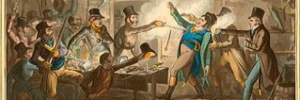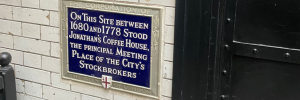I spoke with Sarah Murden to talk about dental care during the Georgian era.
My first question was ‘What did the Georgians use to brush their teeth?’
Here’s what she said:
“A Frenchman, a chap called Pierre Fauchard, actually studied the anatomy of the mouth and looked at the actual teeth, looked at the construction of the teeth and he started to write documents and, I think, wrote a thesis on what we were doing wrong, this is what we should be doing and this is how to look after the teeth better.
I think some of that had come about because we were sort of falling in love with sugar and the teeth, consequently were rotting very very quickly. And so I think, I don’t know what spurred him on to write about it, but I think I suspect in the fact that you knew so many people walking around, either in pain or with no teeth at all, that he thought probably there’s gotta be a better way than this to, to manage then dental care. But he was one of the first people, if not the first person, to discover that acidic foods like lemons, limes were actually causing erosion of the enamel, something that we know today. We know if you sort of suck on a lemon for too long it’s not going to do your teeth much good. He obviously knew. I wasn’t going to be good with the teeth. But he did, however, recommend cleaning the teeth with human urine.”
When were toothbrushes invented?
“Toothbrushes, that’s another story of itself. William Addis was from Clerkenwell. The story goes that around the 1770s. He was involved in a riot and found himself in jail. Whilst he was in jail he wanted to clean his teeth. So he manages to find a piece of bone left from the food that they were being given. And he fashioned that somehow into a handle and then managed to get some bristles from one of the yard brushes from one of the guards. He managed to put these yard brush bristles into the bone and hey Presto! you have a toothbrush.
When you start to look back at adverts.. back in the 1750s there were ‘brushes for teeth’ for sale and they would cost 6d. Which is not, even then. It’s about three pounds in modern money, so it’s not that they were a prohibitive price. That makes me think that some of this was a great marketing tool by William Addis at the time.”
To give WIlliam Addison credit for inventing the toothbrush is perhaps a little too strong a statement. The word ‘toothbrush’ wasn’t new, it had first appeared in English in 1690 when Anthony Wood bought such an implement from a Mr J Barret (as mentioned in his describes in his autobiography) Even though the word toothbrush was relatively new, the items themselves had been around for centuries. We know that the Chinese made ones from bamboo, with hog’s bristles. Cary Grant tells Doris Day ‘The Hindus use twigs’ in That Touch of Mink. Why had they not caught on earlier? Was chewing sticks or rubbing with rags soaked in urine so appealing? Certainly applying a gentle abrasive such as charcoal, salt or coal dust, even though plentiful, surely didn’t make it any easier? There’s a recipe from c. 1690 which called for a mix of powdered charcoal, dried sage and salt which, one can imagine, would have been fairly efficacious.
In 1780, Addis started a company which made toothbrushes from his premises in Whitechapel, East London. They were an overnight success. Initially he supplied them through his contacts in the book industry, a sort of “buy a book and get a free toothbrush’ kind of offer which we still see when selling magazines today. Sure enough the sales pitch worked and word spread about this ‘must-have’ product. Other brands soon joined in the new sensation too. But it is the Wisdom who can claim their company was established over 235 years ago as Addis by its rioter founder; William Addis of Clerkenwell.
Listen to Sarah Murden talk about Georgian dentistry in Episode 71: Georgian Dentistry, duration 20 mins.



